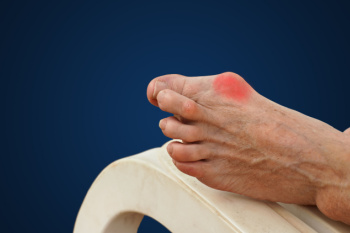Why Do People Get Bunions?
Tuesday, 25 March 2025 00:00
Bunions are a common foot problem that causes a bump to form at the base of the big toe. They happen when the bones in the front of your foot shift out of place, making the big toe lean toward the second toe. This can cause pain, swelling, and difficulty finding comfortable shoes. Many people get bunions because of the shape of their feet, which they inherit from their family. Wearing tight, narrow, or high-heeled shoes can make bunions worse. Other causes include flat feet, arthritis, and foot injuries. Bunions can get worse over time, if not treated. Early treatment, like wearing wider shoes or using custom orthotics, can help relieve discomfort and slow the bunion’s progression. If you notice a bump forming or feel pain in your big toe joint, it is suggested that you see a podiatrist for relief options.
If you are suffering from bunion pain, contact Dr. Steven Schwartz of Pennsylvania. Our doctor can provide the care you need to keep you pain-free and on your feet.
What Is a Bunion?
Bunions are painful bony bumps that usually develop on the inside of the foot at the joint of the big toe. As the deformity increases over time, it may become painful to walk and wear shoes. Women are more likely to exacerbate existing bunions since they often wear tight, narrow shoes that shift their toes together. Bunion pain can be relieved by wearing wider shoes with enough room for the toes.
Causes
- Genetics – some people inherit feet that are more prone to bunion development
- Inflammatory Conditions - rheumatoid arthritis and polio may cause bunion development
Symptoms
- Redness and inflammation
- Pain and tenderness
- Callus or corns on the bump
- Restricted motion in the big toe
In order to diagnose your bunion, your podiatrist may ask about your medical history, symptoms, and general health. Your doctor might also order an x-ray to take a closer look at your feet. Nonsurgical treatment options include orthotics, padding, icing, changes in footwear, and medication. If nonsurgical treatments don’t alleviate your bunion pain, surgery may be necessary.
If you have any questions, please feel free to contact our offices located in Chambersburg, and Mcconnellsburg, PA . We offer the newest diagnostic and treatment technologies for all your foot care needs.

